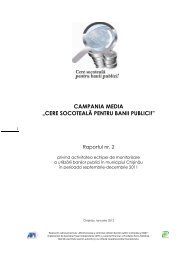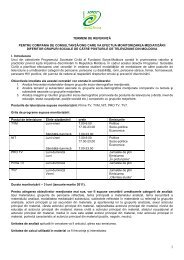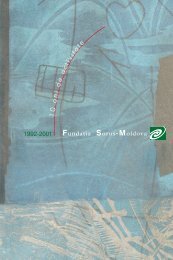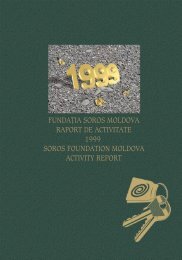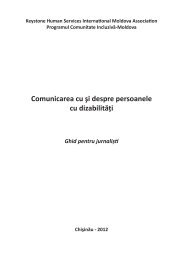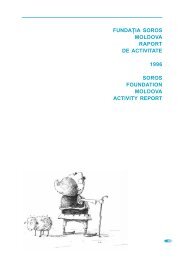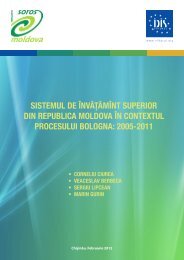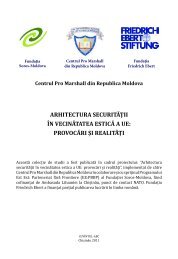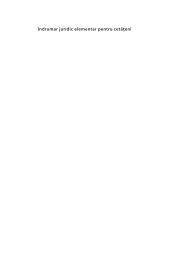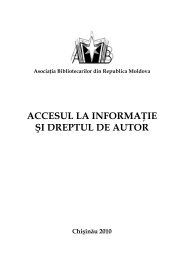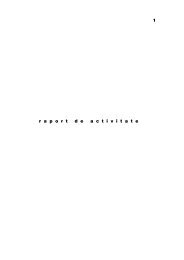Perceptions of the Population of the Republic of Moldova - Soros ...
Perceptions of the Population of the Republic of Moldova - Soros ...
Perceptions of the Population of the Republic of Moldova - Soros ...
- No tags were found...
Create successful ePaper yourself
Turn your PDF publications into a flip-book with our unique Google optimized e-Paper software.
<strong>Perceptions</strong> <strong>of</strong> <strong>the</strong> <strong>Population</strong> <strong>of</strong> <strong>the</strong> <strong>Republic</strong> <strong>of</strong> <strong>Moldova</strong> on Discrimination: Sociological Study 5Summary1. <strong>Perceptions</strong> <strong>of</strong> <strong>the</strong> population on <strong>the</strong> groups<strong>of</strong> people frequently discriminated in <strong>Moldova</strong>• Even if discrimination <strong>of</strong> some groups <strong>of</strong> people is considered an important problem by morethan 2/3 <strong>of</strong> respondents, in <strong>the</strong> agenda <strong>of</strong> important issues it is ranked second last, following <strong>the</strong>issues related to unemployment, price rise, underdeveloped economy, low pensions, reducedaccess to healthcare services, underdeveloped infrastructure, political instability and even lowaccess <strong>of</strong> youth to education.• Every third respondent considers that, in <strong>the</strong> recent 5 years, <strong>the</strong> discrimination increased. Theshare <strong>of</strong> people who believe that discrimination increased is larger among women, respondents<strong>of</strong> Russian ethnicity and wealthy people.• While 89% <strong>of</strong> respondents mentioned that tolerance is a very important value, this was ranked<strong>the</strong> sixth among values, following such values as faith in God, respect for o<strong>the</strong>r people, respectfor <strong>the</strong> law, freedom and equality. The share <strong>of</strong> respondents that consider tolerance a veryimportant value is higher among persons with higher education (92%) and those <strong>of</strong> 18-34 years<strong>of</strong> age (92%).• While 80% <strong>of</strong> interviewed individuals consider tolerance and respect for culture <strong>of</strong> o<strong>the</strong>r nationsa very important and important value, only quite over 20% <strong>of</strong> respondents stated that <strong>the</strong>se arerespected to a large and to a very large extent in <strong>the</strong> country. The smallest discrepancy wasfound in case <strong>of</strong> <strong>the</strong> value ‘faith in God’: 94% consider this an important value and <strong>the</strong> samepercentage considers that it is respected to a large and very large extent.• While over 80% <strong>of</strong> respondents named <strong>the</strong> trust in people a very important and important valueand over 50% mentioned that this value is respected in our country, on <strong>the</strong> level <strong>of</strong> individualperception, only every third respondent mentioned that he/she has very much and much trust inpeople. The respondents show a higher trust in members <strong>of</strong> <strong>the</strong>ir families (95%), followed, at aquite long distance, by <strong>the</strong> priest (58%), neighbors (50%), <strong>the</strong> head <strong>of</strong> <strong>the</strong> center <strong>of</strong> family doctors(46%) and <strong>the</strong> school director (44%). Over 2/3 <strong>of</strong> respondents mentioned that <strong>the</strong>y have no trustin <strong>the</strong> mayor and police <strong>of</strong>ficers.• On perception level, <strong>the</strong> respondents consider that most frequently discriminated people in <strong>the</strong><strong>Republic</strong> <strong>of</strong> <strong>Moldova</strong> are persons with mental and physical disabilities (68% and 66%), followedby <strong>the</strong> poor (59%), HIV-positive persons (56%), <strong>the</strong> elderly ( 50%), representatives <strong>of</strong> gay andlesbian community (49%), <strong>the</strong> Roma (48%) and women (32%).2. Social contexts in which various groups <strong>of</strong> people are discriminated• In accordance with <strong>the</strong> Dominant Personal Opinion Index (DPOI) 1 <strong>the</strong> persons with disabilities arediscriminated most frequently at employment (-63), in <strong>the</strong> workplace (-51) and in educationinstitutions (-31). The poor are discriminated more frequently in hospitals/health centers (-40), ineducation institutions (-36) and at employment (-32). The HIV+ persons are discriminated mostfrequently at employment (-42), in <strong>the</strong> workplace (-38), in relation with authorities (-25) and inhospitals and health centers (-19). The elderly are discriminated more frequently at employment(-51), in <strong>the</strong> workplace (-37) and in relations with authorities (-22). The representatives <strong>of</strong> lesbianand gay community are discriminated more frequently in <strong>the</strong> workplace (-18), at employment (-17) and in education institutions (-15). Roma people are discriminated more frequently atemployment (-6) and in <strong>the</strong> workplace (-1). Women are discriminated more frequently atemployment (24), in <strong>the</strong> workplace (29) and in political life (19).1The Dominant Personal Opinion Index (DPOI) was calculated using <strong>the</strong> formula (p-n)x(100-ne):100, where p is <strong>the</strong>frequency <strong>of</strong> positive opinions, n – frequency <strong>of</strong> negative opinions, ne – frequency <strong>of</strong> neutral opinions. The indexranges on a scale from -100 to 100. The closer to 100 <strong>the</strong> index is, <strong>the</strong> lower <strong>the</strong> level <strong>of</strong> discrimination is.




